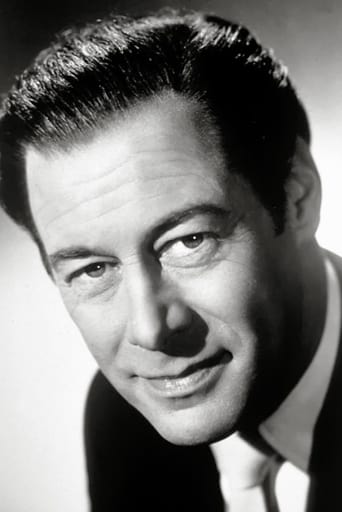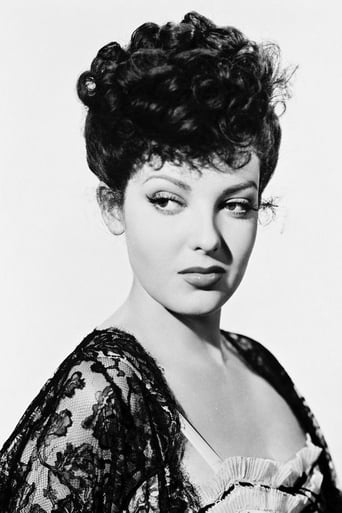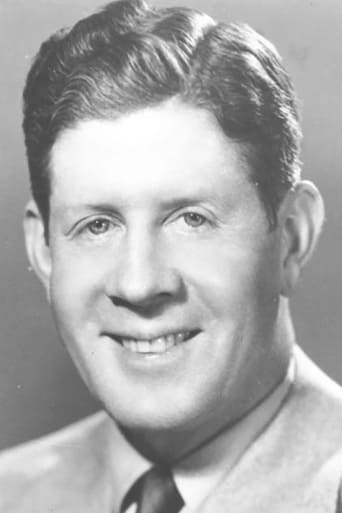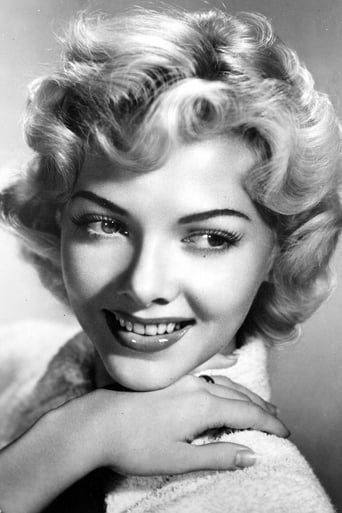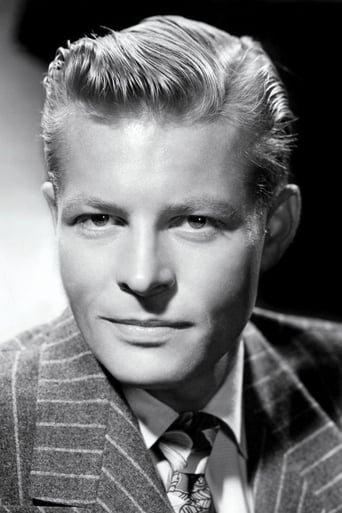TrueJoshNight
Truly Dreadful Film
ScoobyWell
Great visuals, story delivers no surprises
HottWwjdIam
There is just so much movie here. For some it may be too much. But in the same secretly sarcastic way most telemarketers say the phrase, the title of this one is particularly apt.
Cody
One of the best movies of the year! Incredible from the beginning to the end.
Spikeopath
Well well, I certainly found this to be a very mixed bag, I simply adore Preston Sturges, the satirical wit in many of his classic standards is still thrilling new fans as each year passes by. This one was one I had to hunt down to add to my collection purely because of its director, and what trusted review sources I looked at led me to expect an undervalued masterpiece. Sadly the film only hints at greatness and I wasn't in the least bit surprised to find that the film had been cut by 20 minutes such was the uneven feel I got from it.The film centres on a comic slant of misconception, mistrust, and one mans zany decent into jealous madness. Believing his beautiful wife is having an affair, top conductor Sir Alfred De Carter {an ebullient Rex Harrison} dreams three scenarios that will give him peace, all very different, and all played out to the accompaniment of classical music, Rossini's-Semiramide, Wagner's-Tannhauser, and Tchaikovsky's-Francesca de Rimini. These sequences lift the film out of the stupor that besets the piece for most of the first half, and this sets us up nicely for the finale as we see which route Carter has chosen and of course the mirthful results that ensues.Back on release the film didn't catch on, and we can only wonder what the film would have been like with the added scenes still in place, I like to think that Sturges really had crafted the masterpiece that some top line critics today believe the film actually is. The film was also blighted by a sad scandal as Rex Harrison's girlfriend Carole Landis committed suicide and naturally the films distributor {Fox} felt the films subject matter was just too close to the bone to support wholesale, and the subsequent lack of support practically killed the film on release to the point that Sturges never made another American film again . It's an entertaining film, the music working with the mindset of the protagonist works a treat, and the comedy stands up well to tickle the ribs, but it will always be a case of so near, yet so far, but that of course is my own humble opinion.7/10
preppy-3
World famous conductor Sir Alfred De Carter (Rex Harrison) is in love with his young beautiful wife Daphne (Linda Darnell). He suspects her of cheating on him and, while conducting three separate pieces at a performance, figures out three different ways of punishing her--including murder. When he tries to carry them out everything goes wrong.This movie is, at times, very black. It starts out pretty funny with Harrison spitting out his lines rapidly and his sense of comic timing was just perfect. When he has the fantasies though it turns dark and is pretty gruesome--especially for 1948. However, when he tries to carry them out and things go wrong, the film is uproarious. I've seen this film three times and I STILL laugh out loud at the last section. I saw it at a revival theatre two times and people were literally bent over in their seats helpless with laughter! This isn't for everybody--it was a critical and commercial bomb in 1948 and a lot of people still find it too sick to be funny. I can see their point--there's nothing funny about a man trying to kill his wife, but this is a MOVIE--not real life. It all ends happily also.My only problem, and this is minor, was Darnell. She seems miscast here. But the script is quick and witty, the cast is great and they all go full throttle and the use of music is superb. Basically one of the funniest black comedies ever made. A must see! This gets a 10 all the way."Purple with plumes on the hips"
theowinthrop
After 1944's MIRACLE OF MORGAN'S CREEK, Preston Sturges and Paramount parted company. He was too independent a film creator, in a period when film was made in a studio factory system with levels of producers watching how films turned out. Most of his movies had been profitable (one exception was his attempt to do a straight dramatic story - THE GREAT MOMENT). But he was too big for this type of pressure. So he left the studio and proceeded to make two independent (or semi-independent) films. The first was THE SIN OF HAROLD DIDDLEBOCK with Harold Lloyd, produced with Howard Hughes. The results were pretty good, but certain flaws prevented it from being fully successful, and Hughes re-cut the film when he re-released it. The second, done at Twentieth Century Fox, was UNFAITHFULLY YOURS. Here, he had problems with Fox chief Darryl Zanuck that mirrored the problems he had at Paramount. But the resulting film was one of his best works. As mentioned elsewhere it was his dark comedy, his MONSIEUR VERDOUX (which appeared a few years earlier).Rex Harrison is the great British conductor Sir Alfred De Carter, who is married to the beautiful (but somewhat younger) Daphne (Linda Darnell). Daphne is sister to Barbara (Barbara Lawrence) who is married to a billionaire August Henschler (Rudy Vallee) Leading a major orchestra on tour, De Carter finds when he gets home that August hired a detective (Edgar Kennedy) to keep an eye on Daphne. There is a full report suggesting that her behavior was incorrect. De Carter is furious at August's actions, and goes to confront the Detective. But he finds Sweeney the Detective a fan of his music, and actually a fairly reasonable man. After an initial moment of anger, De Carter decides to read the report. He finds that the evidence suggests that Daphne has been having an affair with his secretary Anthony (Kurt Krueger). The background of the story, and an interesting sequence showing Sir Alfred in rehearsal, takes up about half an hour of the movie to set up the story. We see Sir Alfred (deeply troubled, and already snapping at Daphne and Anthony) conduct Rossini, Tschaikovski, and Wagner in a three part concert. Each time he conducts he is thinking of his marriage partner and how to handle her. He imagines a perfect murder that pins the killing on Anthony. He imagines an overwhelmingly saintly version of himself being all forgiving and generous to his departing wife, leaving a self-hating Daphne in tears. He finally imagines confronting Daphne and Anthony with his pistol and playing Russian Roulette, ending with his own shocking suicide.The concert ends, and the conductor goes home to put his schemes into effect, starting (of course) with revenge by murder. Of course, if this was a Lang or Hitchcock film the revenge would have been effectively carried out. It's Sturges however, so everything possible to carry out the "perfect" murder goes wrong. My personal favorite is a recording device that will enable him to make a record of himself saying "Help...Tony stop! Stop!" or something like that, and changing the pitch to resemble the voice of Daphne screaming! In the vision it was so simple. But the recording device falls through a window, causes Harrison to fall through a chair, keeps throwing the record off the turntable, and when he tries to follow the "easy to follow instructions" the plans look more complex than an atom smasher.The same thing is repeated for the two other visions, with equally embarrassing failures. It is only at the tale end of the film that Sir Alfred is able to find a quiet way out of the mess of his life, without any real embarrassment.Sturges did very well indeed in this film. Harrison was quite pleased with this role, which he felt (with THE GHOST AND MRS. MUIR) was the best he did in Hollywood in the 1940s. He felt that Sturges' script was better than Shakespeare. The film also gave Sturges the chance to give Edgar Kennedy a splendid last moment on screen, as the Detective who loves De Carter's handling of Handel and Frederick Delius. Kennedy is only in the film about five minutes, but does well - even though he looks ill (he'd die in 1948). Lionel Stander, as Carter's business manager Hugo, keeps the annoyed conductor from ringing his idiot brother-in-law's neck several times. Linda Darnell is as sexy as she appeared in LETTER TO THREE WIVES, and to the end we wonder if she and Anthony did have an affair. And Vallee appears as hopelessly incompetent in being helpful as he was in romancing Claudette Colbert in Sturges' THE PALM BEACH STORY.But the film failed. There is a downer atmosphere around it of death. First Kennedy's demise (mentioned above), and then the Harrison - Carole Landis Suicide Scandal as well. The idea (to a 1948 American audience, tired of death from World War II) of humor from subjects like murder and suicide was too much. The film flopped, and Sturges never regained his footing. Following it came the half-way decent THE BEAUTIFUL BLONDE OF BASHFUL BEND with Betty Grable, which ended his Fox years, then his living abroad in Paris, and then the awful THE FRENCH, THEY ARE A FUNNY RACE. One can only say that at least Sturges did do the string of great comedies that he was able to do while he could, and be grateful for that.
historybuff2283
Unfaithfully Yours is a wonderful film, full of sharp, witty dialog and humor. Rex Harrison plays Sir Alfred De Carter, a famous conductor, just returned home from a world tour. While he was away his brother-in-law (Rudi Vallee), having misunderstood a request made by Sir Alfred, hired a PI to trail his wife (Linda Darnell). Alfred initially refuses to read the report, which he had never ordered, but eventually gives in to temptation, reads the report, and discovers that his wife was caught in an apparently compromising position with his valet. Consumed with jealousy, convinced his wife is having an affair, Sir Alfred begins to imagine in day-dream-like sequences various ways of seeking revenge. When he tries to enact these fantasies, however, everything goes terribly, hysterically, wrong.



